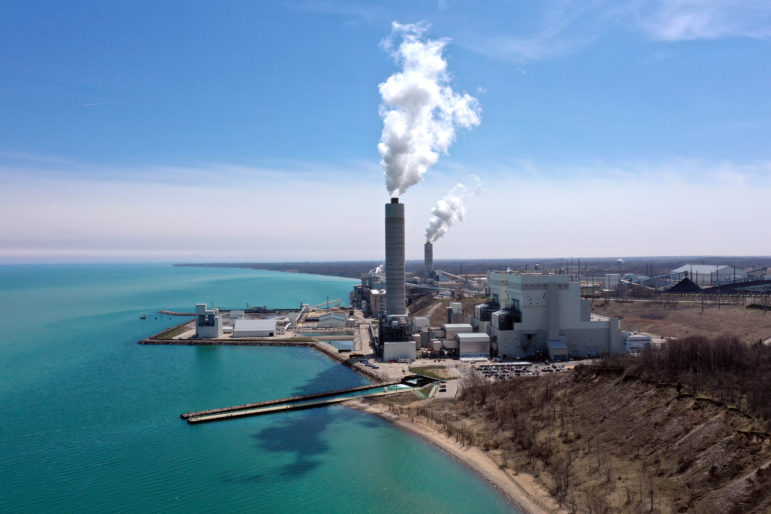How We Energies Spends Your Money
Profits from ratepayers funds foundation that gave $1 million to UWM and helps utility look like a good guy.

Photo by Coburn Dukehart/Wisconsin Watch.
The Public Service Commission of Wisconsin (PSC), which oversees utilities like We Energies, goes back to a 1907 law, when Wisconsin became one of the first states in America to regulate public utilities. The PSC’s mission is to assure that these monopoly utilities charge “affordable” rates, and the evidence suggests that in the case of We Energies, the commission has failed.
Take if from Thomas Content, executive director of the non-profit advocacy group, the Citizens Utility Board (CUB) who recently wrote a news release noting that We Energies electric rates “have risen to be ranked 7th highest among 51 Midwest utilities, and its rate increases have far exceeded the inflation levels over the past 20 years.” Yet the company’s most recent request was for a 8.3% increase in electric rates and an 8.4% increase in gas rates, which “means another pill for customers to swallow and more pressure on household energy burdens that are already far too high for many customers in southeastern Wisconsin,” Content charged. We Energies spokesperson Brendan Conway disputed Content’s description saying that “our average residential customer bill is nearly the same as the other large utilities in Wisconsin and in line with the typical bills across the Midwest.”
Around that same time CUB was born another advocacy group was created, the Wisconsin Industrial Energy Group, a non-profit whose budget comes from more than 30 industrial firms that are concerned about rising rates for electricity. A study by WIEG found Wisconsin utilities had the second-highest profit margin among 26 states studied.
Indeed the company’s earnings have been a boon to stockholders, who have “consistently” enjoyed “among the best total returns in the industry,” the We Energies website has bragged, including an annual average shareholder return of 15.1% from 2002 to 2017.
The shareholders are doing so well that they have approved the company spending money on advertising to boost its image with slogans like “People You Can Trust” and “Energy You Can Depend On.” Considering it is a legal monopoly with no competitors, you might wonder why such advertising is needed
But that’s only the beginning of the money spent to burnish the image of We Energies. Its shareholders have also approved “sponsorships” of just about any sports team you can think of, including the Milwaukee Bucks and Brewers, Green Bay Packers, Milwaukee Admirals, and the various teams fielded by UW-Milwaukee and Marquette University. They all carry We Energies ads designed to make us feel better about a company with some of the highest rates in the Midwest, but the company, though it is publicly regulated, won’t disclose how much is spent on this campaign.
But perhaps the biggest image builder is the We Energies foundation, which donates more than $10 million annually to a wide variety of organizations, all within its service area. “Since the early 1980s, We Energies has invested hundreds of millions of dollars in communities across Wisconsin. Funding is made possible thanks to the generosity of WEC Energy Group shareholders and does not come from customer rates,” a press statement by the company noted.
That’s the same explanation offered by Matthew Sweeney, public affairs officer for the PSC, who emailed this to Urban Milwaukee: “The PSC does not have regulatory oversight of We Energies’ charitable foundation. Donations to foundations or the funds are not part of a utility’s rates. My understanding from reading their website is that the money comes from shareholders who are donating a portion of their return on investment.”
And where would that “return’ come from other than company revenues which come from the ratepayers? Sweeney’s reply: “You are correct that the return is recovered in rates. At the PSC, we do not have the authority to regulate or scrutinize how investors use their return on investment.”
“Sometimes that is a grant to a local food bank, environmental effort or arts group. Other times the giving is during an emergency like the COVID pandemic or after the Waukesha Parade attack,” Conway noted.
But big grants have been given to major institutions, such as a recent $1 million gift to UW-Milwaukee “to establish the We Energies Scholarship Fund and the We Energies Student Success Fund.” Meaning countless students and families will be thanking We Energies in years to come for money that originally came from average ratepayers.
And the foundation gave $750,000 to the Milwaukee Zoological Foundation, a group whose board has been known over the years for having many politically-connected heavyweights.
A 2019 report by the Energy and Policy Institute found that public utilities use charitable giving “to influence politics and increase investor profits.” The donations boost the “general public relations efforts” of the companies, the report noted, as utilities “routinely send out press releases boasting of their latest grants.”
Beyond this general impact, the report also found that foundation grantees “weigh in on political matters in support of utilities,” that utilities “give to organizations connected with or favored by important policymakers,” and “use philanthropy to suppress resistance and dissent” to the company’s goals. The use of foundations to build political power has become a playbook for investor-owned utilities in America.
We Energies has long had remarkable political clout in Wisconsin has Urban Milwaukee has reported. Its foundation helps to reinforce that power and overcome the negative impression that might come from pushing its rates and returns to such high levels. And the best part of it is that we the ratepayers are really paying for this philanthropy.
If you think stories like this are important, become a member of Urban Milwaukee and help support real, independent journalism. Plus you get some cool added benefits.






















Meanwhile We Energies is putting up obstacles to distributed, rooftop solar left and right. They (correctly) see rooftop solar as a threat to their massive profits. We Energies is not serving the public interest; they are serving their shareholders and executives.
We Energy wouldn’t get away with gouging their customers like this if Vladimir Putin was President of the United States. All of the We Energy executives would lose their jobs and be thrown in prison.
Thanks for writing this Bruce. David Coles is exactly right. FYI: distributed solar energy is local, on site, household, business or community owned and community based. Wisconsin’s PSC is also enabling third party merchant power plants to bulldoze the best farm and habitat landscapes in the state with expensive “clean energy” projects that are nothing of the sort. 3rd party merchants can circumvent all the regulations utilities are supposed to follow…..then companies like We Energies and Madison Gas and Electric simply purchase the “clean energy” development having avoided almost all regulations for things like: watershed and environmental studies, economic impacts on surrounding communities, lack of cost/benefit comparisons with more sensible alternatives and DEBT on our electric bills (45-60% of your bill!). Get ready Wisconsin, you won’t recognize the landscape or your electric bill in the very near future. Governor Evers needs to appoint commissioners who haven’t been enriched by the utilities and actually listen to the public.